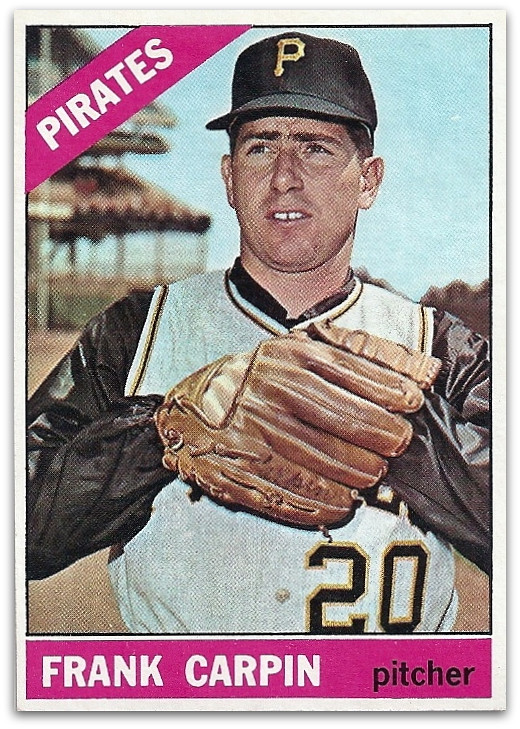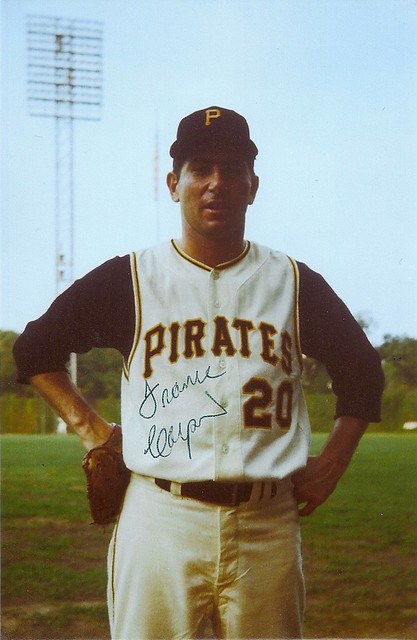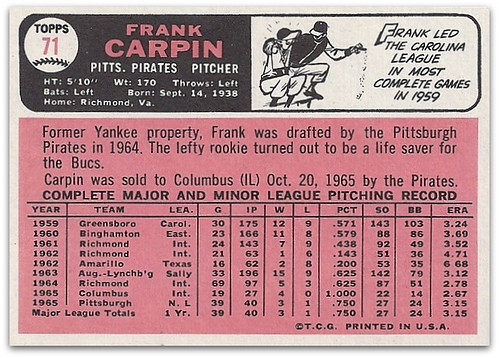





 As the "From Notre Dame to the Major Leagues" series resumes today, it bears a new look. First, it has a graphic, however rudimentary, that, when clicked, will take you to all of the posts in the series. There's a simple graphic -- an include, as we call it in the biz -- embedded in each post and a static one with player images at the top of the right rail.
As the "From Notre Dame to the Major Leagues" series resumes today, it bears a new look. First, it has a graphic, however rudimentary, that, when clicked, will take you to all of the posts in the series. There's a simple graphic -- an include, as we call it in the biz -- embedded in each post and a static one with player images at the top of the right rail.





Baseball had no part in my decision to attend ND. I chose ND because of its reputation and Catholic background. My first choice was West Point, but that was not an option when I realized my pro baseball potential. I turned down scholarships to many Southern schools, including Wake Forest [the 1955 NCAA champ]. Ironically, the man who got me the scholarship was Syd Thrift, a Pirate scout, who later engineered my being drafted from the Yankee farm system. I did receive a walk-on scholarship at ND, but signed [with the Yankees] after one year.
Despite signing with the Yankees in 1959, the Tigers made a better offer. [John] McHale was the GM then and an ND graduate. But my father liked the Yankees and since the Dodgers were not interested, the natural choice was the opposition ... just like ND became the choice when West Point was not possible.
The most humbling [moment] was being sent down in 1962 by the Triple-A Yankee team from my hometown -- Richmond -- to the Texas League. I went from a prospect who nearly made the Yankees in 1961 and 1962 to a suspect who could not win a game until sent out of the organization in 1963 to Lynchburg.
I told this story to the young kids I coached to help them understand what is necessary to be successful in sports or any field. In 1963, I was languishing in the bullpen in Double-A Augusta, Georgia, after a horrible 1962 season and demotion from Triple-A to Double-A. I literally could not get anybody out and the August manager had to send someone out at cut time. They couldn't send me back to Greensboro, where I had started five years earlier, because of option rules, so they offered me to Lynchburg in the same league. I walked across the diamond that night to join the opposing Lynchburg team, and the manager, Les Moss, asked if I could pitch that night because I was all they had. I eagerly accepted the start and pitched better than I had in two years. The minute I crossed the diamond from one clubhouse to another, everything changed. Two of my next three starts were shutouts on the way to a 15-game winning season and another win in the playoffs against my former Yankee teammates. I asked my kids -- What changed? I had the same arm and same "stuff." The only performance-enhancing substance I took was Wheaties. That's how much the mental aspect plays in sports and the confidence you get when someone tells you, "You're all we got."
The happiest moment was the news of the call-up while in Triple-A early in 1965 and the win that night. My debut was very memorable: Two innings of relief and a win against the Cubs that started a long winning streak for the Pirates, who had started very poorly. I became a good luck charm among the players.
 The win in Carpin's debut was actually the fifth in a 12-game winning streak for the Pirates that season. Before the streak started, they had been 9-24 on the season; Carpin's win improved Pittsburgh's record to 10-24. By the end of the streak, they were 21-24 and had cut their deficit in the National League from 13 1/2 games to 7 1/2 and improved their standing from last place (10th in the league) to sixth. They spent most of the season in the middle of the pack before going 10-2 over the final two weeks to finish third.
The win in Carpin's debut was actually the fifth in a 12-game winning streak for the Pirates that season. Before the streak started, they had been 9-24 on the season; Carpin's win improved Pittsburgh's record to 10-24. By the end of the streak, they were 21-24 and had cut their deficit in the National League from 13 1/2 games to 7 1/2 and improved their standing from last place (10th in the league) to sixth. They spent most of the season in the middle of the pack before going 10-2 over the final two weeks to finish third.In 1966 I had three children and an expectant wife. There were bone chips starting to develop in my pitching elbow and the Houston doctor told me I had an arthrithic elbow. He suggested they send me home in late August and see how things looked in the spring. I was making $12,000 and this was before free agency and arthroscopic surgery. I also had a Notre Dame degree and my oldest son would start grade school in the fall. My wife said she was not going to accompany me the following year and take my son out of the Richmond school. In addition, I had been working in a training program in the offseason to become a stock broker. All I needed was to pass the exam. I did so that October. What if there had been arthroscopic surgery then? Free agency? More than $12,000 salaries? I rested for two years then started pitching again. Blood flow had dissolved the developing chips and I only pitched once a week in the summer college league in Shennandoah Valley. The results were outstanding. Scouts asked if I would report to their Triple-A clubs right away if they could secure my services. I said no. My brokerage career was taking off, my family was happy in their place and pitching once a week wouldn’t cut it in pro ball. Plus, the money was not there as free agency was still a few years off. But looking back, it is easy to second guess.
Interesting point on Robin Roberts ... I first met him in Yankee spring camp 1961 and renewed the relationship in 1966 at Cocoa Beach (Astros). He invited me fishing in Ft. Lauderdale and we surf fished together at Cocoa Beach. My first encounter with him was Richmond, Va., circa 1949. The Phillies were barnstorming north prior to the season and they came to Richmond to play the Cardinals. I was the only one at the ballpark early one Saturday morning when I saw him staring at the outfield in a box seat. I asked for his autograph and he never broke his stare. In 1961, I told him that story and the next day two autograph pictures were in my locker. Then he invited me fishing offshore and in 1966 he confided with me about Marvin Miller and his part in having a players union with Marvin as head. He introduced me to Marvin, who was also a Brooklyn native and Dodger fan. The Astros, I believe, were the only team that voted against the union and Marvin Miller. Management poisoned everyone's minds, except me ... The rest is history. Maz was a great teammate in Pittsburgh and Willie and Roberto were obviously great players. My Astro experience was a big letdown after Pittsburgh.
Looking back on my decisions as a young man, I do regret leaving Notre Dame after one year as a baseball player. My education and receiving a degree is not the issue. I graduated in February 1962 with a B.A. in history. Although my career at ND was short, I am more proud that I was Domer than I was a Major League player. And I regret that I cut my college athletic experience short. I think about this when the NFL beckons with the big money. Today's players don't have much choice with injury a major concern, especially football players. But baseball is different. There was some money involved, but the main reason I jumped was wanting to find out if I could compete. Patience has never been a virtue, but I wish it had in respect to ND.






Labels: Astros, autographs, baseball cards, Frank Carpin, ND to MLB, photos, Pirates